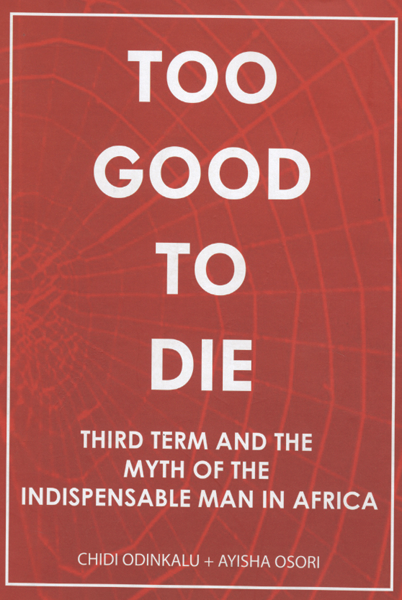YESTERDAY…
Authors explored the origin of the idea prevalent in Africa that the military should supply politicians who are too good to die. They located this notion in the political and economic structure of African states, functions of leaders, and what they called the (assumed) intrinsic mission of the military
PROLOGUE
“We are now talking (sic) that our president has done so well that we need to extend his period for him. This kind of dictum is not natural. Nobody is too good to die.”
At the beginning of May 2006, the Senate, as the upper legislative chamber in Nigeria’s national parliament, began consideration of an extraordinary bill to amend 116 items in Nigeria’s Constitution. All sides involved in the debate knew they were playing for high stakes. Under the existing Constitution, the president and all thirty-six state governors were limited to not more than two terms of four years each. If the amendment succeeded, Nigeria was fated to return to a history of disorderly and unstable transfer of power.


The onset of the seasonal rains in May was not enough to cool the temperature in the country, fired as it was by the political heat generated by the debate. Amidst a spate of unexplained assassination attempts, arson attacks and threats of political violence, the senators embarked on a debate that would shape Nigeria’s young experiment in elective government.
A pioneer of Nigeria’s private sector, Raymond Aleogho Dokpesi got sucked into this contest. Few people know the difficult world of doing business in Nigeria like Dokpesi. In a country ruled for a long time by capricious soldiers, the most successful business people learnt to make their peace with every and any government in power. A highly decorated traditional chief from the Niger Delta, Dokpesi knew these rules of the game better than most.
Armed with a doctorate degree in Marine Engineering from Poland, Dokpesi was equally familiar with the incestuous relationships that characterised the intersection of politics, business and the military in Nigeria. Among his mentors, Dokpesi counted Alhaji Bamanga Tukur, a well-networked, former Managing Director of the Nigerian Ports Authority (NPA). When he was sworn in as governor of the now defunct Gongola State in North East Nigeria in October 1983, Tukur tapped Dokpesi to serve as his chief of staff.
That partnership was short-lived, terminating when the military sacked the elected civilian government three months later at the end of December 1983. 15 years later, as the military prepared to return the country to civil rule, Tukur became one of the founding members of the Peoples Democratic Party (PDP), widely seen as the favorite party of the departing military. Dokpesi’s circle of business partners had also included Chief Moshood Abiola, a charismatic business mogul whose victory in the presidential elections of 1993 was controversially annulled by the military and Shehu Musa Yar’Adua, who served as second-in-command for over three and a half years in the military government that ruled Nigeria from February 1976 until October 1979.
That regime was headed by Olusegun Obasanjo, an army General who handed over power to an elected civilian administration in 1979. Nearly 20 years later, in May 1999, Nigerians elected Obasanjo, then long retired from the army and a High Chief among his Egba people in South West Nigeria, as civilian president for an initial term of four years. In 2003, he was re-elected for another four years. Under the provisions of Nigeria’s military-dictated Constitution, President Obasanjo, having been elected twice to the presidency, was term-limited and bound to vacate office on 29 May 2007.
As part of its delayed plans to disengage from government in 1992, Nigeria’s military government proposed to deregulate broadcasting. In that year, then military president, General Ibrahim Babangida, promulgated this plan by military decree. Dokpesi made a bid for and received a licence as one of Nigeria’s pioneer private broadcasters. After a long
period of preparation, he launched Africa Independent Television (AIT) in 1996. One decade later, in the early hours of Tuesday, 16 May 2006, an unexplained, early morning fire outbreak destroyed Dokpesi’s home in Agenebode, in Edo State. In the fortnight preceding this incident, Dokpesi’s AIT Network had provided gavel-to-gavel coverage of a riveting debate on the floor of the Senate on the bill to amend Nigeria’s Constitution. The highlight of this bill was proposal to eliminate term limits from Nigeria’s Constitution and extend tenure of President Obasanjo. The exact tenure of the proposed extension seemed deliberately opaque. Unsurprisingly, it was hugely controversial.
In the second week of the debate on the bill, Shehu Usman Albishir, a Senator from Yobe North in North East Nigeria, articulated the suspicion of the country when he complained that “the whole idea of this constitutional review is hinged on third term. All the other aspects of the amendment are smokescreen.” This manoeuvre came to be known as the “Third Term Agenda”.
Later that morning on the Senate floor, Kassim Oyofo, the Senator representing Chief Dokpesi’s Edo North constituency, claimed that “the fire incident came from (sic) electrical fault” and narrated that he felt obliged to provide this explanation because“there were already some insinuations that the incident might be related to (Chief Dokpesi’s) activities or his contribution to democracy in letting the world know what happens here.” At this time, there had been no investigation into the fire incident or official determination of what caused it. Like President Obasanjo, Senator Oyofo was a member of the ruling PDP.
Moments later, on the same Senate floor, Saidu Dansadau, from the opposition All Nigeria Peoples’ Party (ANPP) rejected Oyofo’s hypothesis on the fire that razed Chief Dokpesi’s House. “For obvious reasons”, Dansadau declaimed, “they have been mounting pressure on him (Chief Dokpesi) to stop the live transmission of our deliberations.” He implied that the fire incident was an attack on AIT for coverage of the Senate’s proceeding on Constitution amendment. Underlying this was an assumption that the government would have preferred that the amendment
process take place behind closed doors. Instead, the oxygen of publicity denied the legislators any cover or hiding place. Without such publicity, it was felt, it would have been easier to end-run the rules of the legislature and secure the tenure extension. Unlike Senator Oyofo, who came from southern Nigeria, Senator Dansadau was from Zamfara State in Nigeria’s North West.
Senator Dansadau could not offer firm proof for this innuendo but he more than made up with coincidence what he lacked in evidence. Besides, Nigerians were used to stories of mysterious fire that conveniently engulfed institutions under investigation or ate up the property of members of the media and opposition. Forty-eight hours earlier, on 14 May, in Kaduna, within his own constituency in the North West, unknown gunmen had attacked another Senator, Muktar Aruwa.
He escaped with a bullet-riddled car. Again, these kinds of attack were part of a familiar pattern of assassinations that took place as if they were random killings. In this case, the assailants, who had reportedly trailed him in a 504 Peugeot long-wheel (Station Wagon), were four in number. Two of them were reportedly in police uniform while the others wore military fatigues. In his letter reporting this incident to the Senate, Senator Aruwa swore that the attempt on his life was “no doubt a threat to frighten me to change my position by the desperate proponents of Third Term Agenda”. Like Senator Dansadau, Senator Aruwa was from the North West but he was, like President Obasanjo, a member of the ruling PDP.
Six days earlier, at the beginning of the same week, on 8 May, several members of the Senate received similarly worded letters from a hitherto unknown group calling itself the Youth Coalition for Democracy. The letter threatened “unpleasant consequences for you and your family” or any senator who failed to “ensure tenure elongation for (President) Obasanjo.” In reporting this to the Senate, Senator Sule Yari Gandi from the opposition ANPP claimed that he learnt that “there are professional snipers” hired to assassinate those legislators who were against the Third Term Agenda.
For two weeks, beginning on 3rd May, the Senate had been preoccupied with a debate on a bill to amend Nigeria’s 1999 Constitution. To the 320 articles and sections in Nigeria’s Constitution, the bill proposed a massive and confusing 116 amendments. Some of the major proposals clearly contradicted one another. For example, the bill proposed to extend the tenure of the president. At the same time it proposed a clause to write into the Constitution a convention of Nigerian politics to rotate the presidency, giving different parts of the country an opportunity to produce the president in succession. It seemed clear enough to cold logic that any extension of the tenure of the president would defer the enjoyment of the proposal to rotate the presidency.
Contributing to the debate at the beginning of the second week, on 9th May, Lawan Zaramani, a senator from Yobe State in North East Nigeria, informed his colleagues that “this is the very first time that we are experiencing constitutional amendment under a democratically elected government”, reminding them that “the previous amendments and suspensions were all done under the military regime.” He was not entirely accurate.
Three years after Nigeria’s Independence in 1963, the elected civilian government amended Nigeria’s Constitution to remove the Queen of England as the Head of State, change Nigeria into a Republic, create a Supreme Court as the final court of appeal and pave the way for the creation of the Mid-West as the fourth region in the country. None of the politicians involved in the amendments in 2006 had any experience of the process in 1963. For the entire country, this was largely uncharted territory.
Having dominated Nigeria’s politics since 1966, the military prepared and promulgated a Constitution on their own terms as they reluctantly retreated to the barracks at the end of May 1999. Demands to amend the Constitution began almost before the ink was dry on the one that the soldiers left behind. When the amendment of the Constitution was initially mooted in 1999, Senator David Mark, a retired general, opposed the idea, arguing that “we have not practiced the Constitution for enough time.
Source: https://www.vanguardngr.com/2018/10/the-whole-idea-of-this-constitutional-review-is-hinged-on-third-term-shehu-usman-albishir/


